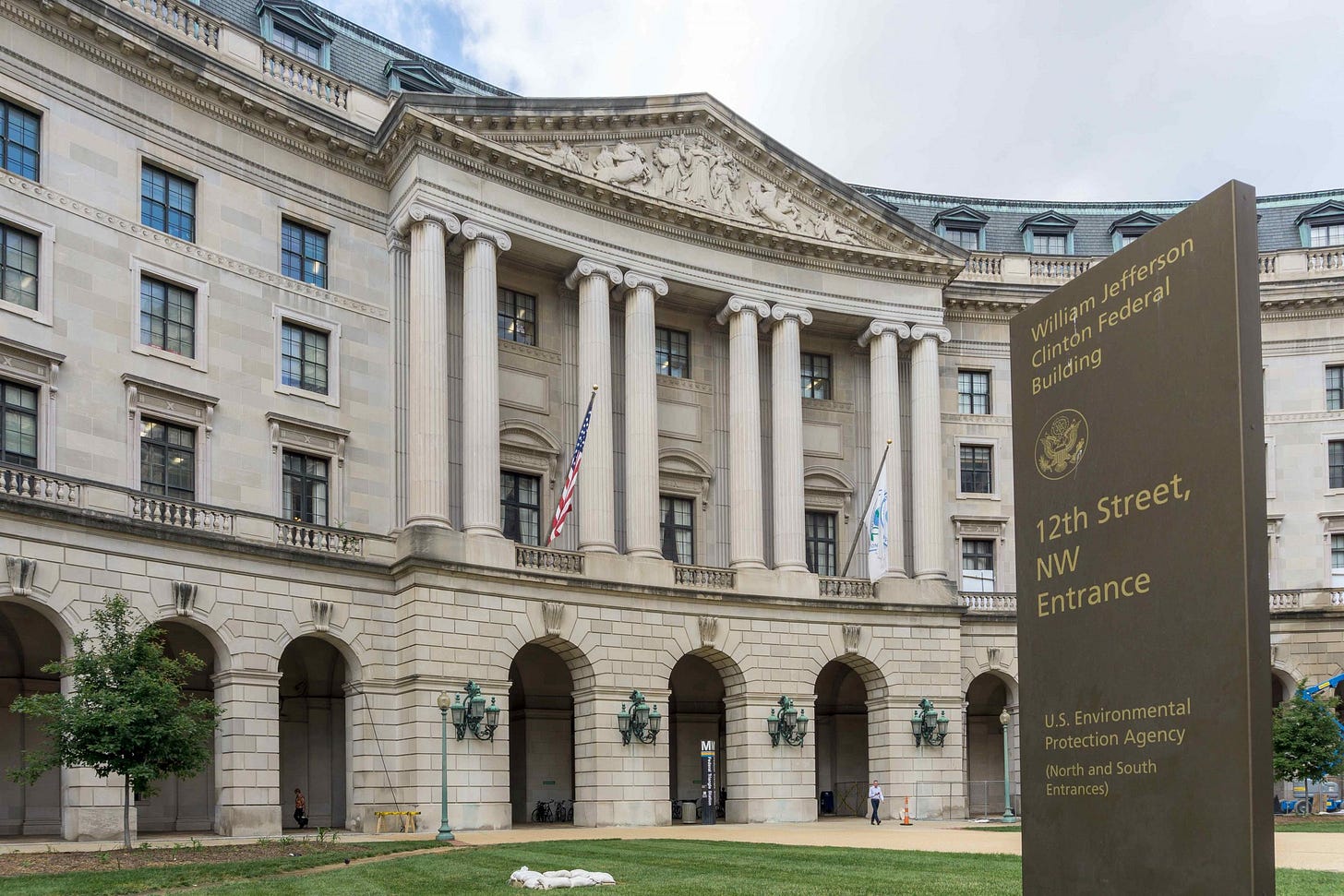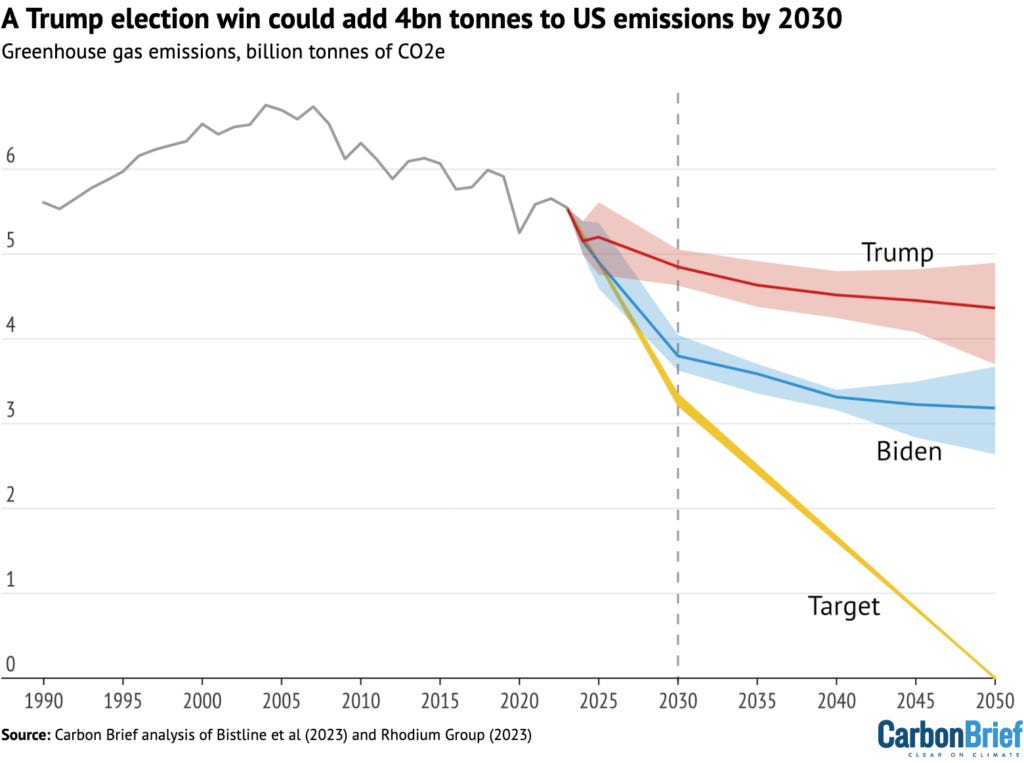🔋Political Winds
What a shift in the White House means for US energy and climate change.
If you found this article interesting, click the like button for me! I would greatly appreciate it :)
Depending on one’s point of view, the two-party system in the US could be a blessing to balance power or a system that stifles progress. Once the opposite party regains the presidency, they often try to reverse much of what the last administration put forward. We saw Biden axe 11 of Trump’s executive orders on the first day in office and similar behavior when Trump entered office for the first time. While I do my best not to inject opinions on overtly political actions (frankly, I shake my head at both candidates we have today), a change in president will have major implications on US energy and climate change policy. In light of the recent presidential debate, let’s look objectively at what another Trump presidency may look like for energy in the US.
Generally, the Democratic party is pro-climate change action, renewables, electric vehicles, and anti-fossil fuels. Biden signed Congress’s Inflation Reduction Act (IRA) into law, allowing for significant government spending toward climate efforts. You bet they would’ve gone further if they could’ve passed it as well. On the other hand, the Republican party often denies climate change, supports fossil fuels, and opposes almost all climate change policies.
As far as emissions are concerned, even with a Biden White House the US isn’t on track to meet its emissions targets. According to Carbon Brief, if Trump regains the White House it could add 4 billion tonnes of emissions.
Expressed another way, the extra 4GtCO2e would be equivalent to double all of the emissions savings secured globally, over the past five years, by deploying wind, solar, electric vehicles, nuclear and heat pumps. - Carbon Brief
What changes exactly might account for this? The easiest changes are the past administration’s executive orders. Trump exited the Paris Accord the first time and would likely repeat it after Biden entered it. He can also axe the federal government decarbonization mandate. You can bet the goals set forth by the federal government like 50% of cars sold to be electric by 2030 and offshore wind targets would not be pushed by the Trump administration.
The big elephant in the room would be the IRA. This legislation would be much more challenging to reverse. To make big dents, a republican dominated congress would be required to make big changes. Perhaps they could attempt to slow down IRA funding by influencing the IRS and tax code without a republican House and Senate.
Another thing we know about Trump is that he is very pro fossil fuels which would slow down any shift away from them. Trump would likely grant more oil drilling licenses on federal lands and influence sentiment for oil companies to drill more. With more drilling in the US, this would likely provide downward pressure on oil prices.
Biden also signed an order to pause new LNG export terminal permits. While this policy was explained to be a climate-conscious one, it is also a protectionist one akin to the import controls abundant in recent legislation and the IRA. While LNG export capacity is set to continue for years to come, Trump would certainly reverse this if he got into office. In Bridge Fuel, I discussed natural gas’s pivotal role in replacing coal in America’s energy generation mix. While much coal production was shifted overseas, the US decreased its carbon emissions meaningfully, primarily due to natural gas. Opening up the arbitrage to ship cheap US natural gas overseas, could help bridge other nations off coal in their efforts to have a cleaner energy mix. Assuming this could help other countries use less coal, this is an area where I can see the Trump administration having a better emissions impact than Biden’s.
Finally, any legal precedent set forth by the Supreme Court becomes difficult to work around. The checks and balances make it so the courts can rule laws or interpretations of the law unconstitutional. Right now the Supreme Court is right-leaning anyway, and recent decisions have been quite controversial. The recent Chevron vs. NRDC decision reverted a roughly 40-year status quo. In short, if congressional legislation is ambiguous, the courts should defer to other federal agencies for interpretations. This gives power to these appointed agencies and the executive branch by extension. Now that Chevron Deference is over, the unelected government agencies have less power. This will mean the Supreme Court and Congress have to be much clearer on their laws and cannot defer lawmaking and responsibility onto smaller government agencies. One issue is that specific agencies are more knowledgeable about their craft, and can we trust the higher government to make decisions about things they know less about?
As relates to climate, the EPA has been used as a tool by the presidents to enforce various environmental laws and regulations. With the EPA having less authority, they will not likely exert the same influence over climate policy. The IRS and Treasury may experience some challenges as they interpret the tax code which can affect the IRA. This change has the potential to be a big change for lawmaking and interpretation. The extent is not yet clear since so much has changed in the last 40 years. There is even a chance the Federal Reserve could be put into question if someone has the political will to. Here are two more pieces related to the topic for further clarity and what it may mean before you form your opinion (1,2). There may be a time of increased importance for lawyers and lobbyists as well.
Some areas are becoming increasingly bi-partisan. Nuclear energy is gaining acceptance on the left as of late which makes it less political than something such as fossil fuels. The parties may also agree on protectionist schemes to limit goods from certain areas. Both Biden and Trump support extensive import controls, specifically aimed at China.
Some things a Trump White House has less control over are state and corporate decisions. Many states have climate goals that cannot be axed by Trump. NY and CA are two out of the top three biggest states by GDP and will likely continue their aggressive climate objectives no matter what. Further, corporations can follow whatever paths they want. Many large public companies (ie. Google) and investment companies (ie. Blackrock) have climate goals.
At the end of the day, there is only so much a Trump administration could do to reverse the climate objectives the Biden administration put in place. What it may signify though is a sentiment shift in the ideas that the parties stand for if Trump is elected once more. To re-state the obvious, Trump winning would put a big damper on most of the climate policies as currently envisioned other than nuclear and natural gas. Until next week,
-Grayson
Leave a like and let me know what you think!
If you haven’t already, follow me at TwitterX @graysonhoteling and check out my latest post on notes.
Socials
Twitter/X - @graysonhoteling
LinkedIn - Grayson Hoteling
Archive - The Gray Area
Let someone know about The Gray Area and spread the word!
Thanks for reading The Gray Area! Subscribe for free to receive new posts and support my work.



